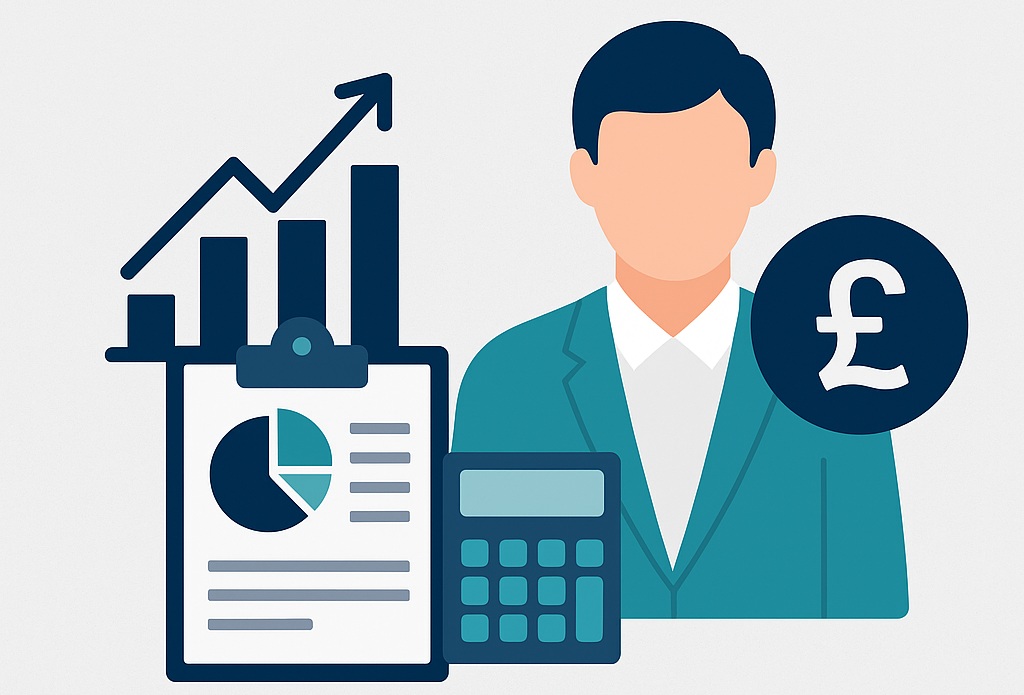Corporation tax is a business tax.
It applies to incorporated companies in the UK, and is based on self-assessment. That means the taxpayer is responsible for calculating their taxable profits and filing a return.
Navigating your way through the corporate tax system in the UK can be complicated, with various allowances that you can claim.
Here we explain what corporation tax is, who pays it, and what you’ll be expected to pay if you’re liable.
What is Corporation Tax and Who Pays It?
Corporation tax is a corporate tax on the profits of businesses.
What is a corporate tax? A corporate tax is one that applies to limited companies, based on their annual profits.
It is like the income tax that individuals pay, but instead applies to businesses registered at Companies House.
Sole traders and partnerships do not pay corporation tax. However, some other groups may need to pay it, even if they’re not incorporated. These include:
- Members clubs, associations and societies
- Housing associations
- Trade associations
- Groups of individuals in business, such as co-operatives
You should check with HMRC or your accountant if you think you might be liable to pay corporation tax.
The company director is responsible for making sure his company’s tax return is submitted on time and for paying the corporation tax bill.
This responsibility still applies even if the company hires an outside accountant to prepare its accounts.
A company must pay UK corporation tax if:
- It is incorporated in the UK, or
- Its central management and control are in the UK
Companies that are non-UK residents will need to pay corporation tax if they have a branch in the UK that is a permanent UK establishment. Where this is the case, the corporation tax due will only be based on that branch’s activities.
Why is There Corporation Tax?
Corporation tax applies to the taxable profits of businesses. Essentially, it’s charged on the income they receive from trading.
According to recent tax statistics, the UK government raises around £800 billion a year in receipts. Of this figure, £53 billion comes from corporation tax.
This tax on corporate income is an essential part of government revenue. It is the next largest source of revenue from taxation after income tax, national insurance contributions (NIC) and VAT.
Corporate taxes provide the government with income besides personal income tax, and the companies paying corporation tax account for a third of the total businesses in the UK.
Revenue from corporation tax is volatile because company profits will vary considerably, depending on different stages of the economic cycle.
Even with corporation tax rates generally declining over 50 years, broadly corporation tax has remained at around two to three per cent of GDP. The reason for this is that the corporate tax base has grown faster than GDP.
In fact, most corporation tax revenue is raised from a small number of companies that make enormous profits.
According to TaxLab, in 2018-19, companies making tax payments of £1million or more paid 55 per cent of all the UK’s corporation tax.
What is the UK’s Corporation Tax Rate?
Currently, the main UK corporation tax rate is 19 per cent.
For banks and companies in North Sea oil and gas production, the rate is higher.
Meanwhile, for profits related to patented technologies there is a 10 per cent reduction.
Since 2016, banks have had to pay an eight per cent surcharge on their taxable profits. However, their first £25 million is exempt from this.
North Sea oil and gas production has overall higher corporation tax rates but also attracts more generous capital allowances.
The main rate of corporation tax is much lower now than it was in the 1970s. Then, companies could expect to pay a 52 per cent tax rate.
In April 2023, corporation tax is set to rise to 25 per cent.
However, not all companies will need to pay this increased rate:
- Those companies with profits below £50,000 will continue to pay corporation tax at 19 per cent
- Companies earning profits between £50,000 and £250,000 will benefit from a marginal relief system, increasing the tax rate gradually until it reaches 25 per cent.
Companies earning over £250,000 will pay the full 25 per cent corporation tax rate from 2023.
This is likely to add further complexity to the corporation tax system.
Do All Companies Pay Corporation Tax?
All limited companies in the UK must pay corporation tax.
Other organisations may also be liable for this tax, including membership organisations, housing associations, co-operatives, clubs and societies.
However, sole traders and partnerships are not liable for corporation tax.
Limited companies must pay corporation tax on:
- Trading profits
- Investments
- Sale of assets
All a company’s profits are taxable. However, they can deduct specific expenses and there are allowances to reduce overall tax liability.
How Do You Avoid Corporation Tax?
If your company is liable for corporation tax you cannot avoid it. But there are ways in which you can reduce it. These include:
- R&D tax credits
- Capital allowances
- Super deduction
- Relief for losses
R&D Tax Credits
R&D tax credits subsidise qualifying research and development activities. Companies can claim against their expenditure on a range of projects and activities.
The value of your R&D claim will depend on the amount of money you’ve spent on these qualifying activities.
SMEs and larger companies can claim R&D tax relief under two separate schemes:
- SME R&D tax relief – where an SME can claim 14.5 per cent of its submitted R&D expenditure
- Research and Development Expenditure Credit (RDEC) – where a larger company can claim 13 per cent of its R&D expenditure.
Companies must check the eligibility of their work for R&D tax credits. To qualify, a project must be part of work that’s making an advance in science or technology.
A qualifying project must:
- Focus on a scientific or technological advance
- Overcome or attempt to overcome uncertainty
- Be complex enough that a professional in its given field could not easily explain it
Where a project does qualify, you can claim for various expenses, such as salaries, subcontractors, consumables, prototypes and software licences.
You should apply for R&D tax relief at the end of your normal accounting period. The work you claim can cover any relevant work up to two years before this date.
If your R&D projects last for several years, you can continue to claim relief on your corporation tax for them.
Capital Allowances
The capital allowances a company can claim to offset its corporation tax bill will depend on the type of assets it has bought.
The annual investment allowance (AIA) lets you deduct the full value of an item you have bought from your pre-tax profits. You can claim this for most plant and machinery, which is the biggest investment category.
From January 2022, the amount you can deduct under AIA will be a maximum of £200,000 a year.
HMRC treats cars differently. They don’t qualify under AIA but you can claim money off depending on the vehicle’s CO2 emissions. It’s a 100 per cent deduction for low emission, new, or used electric cars. Other cars qualify for deductions of 18 or 6 per cent.
Certain intangible assets such as intellectual property may be treated as plant and machinery or come under R&D tax relief.
There are no capital allowances for shares or other financial assets.
Super Deduction
In his March 2021 budget, the Chancellor announced a super deduction that would run until 31 March 2023.
Under this, companies can deduct 130 per cent of investment in plant and machinery from their taxable profits.
There are no limits on the eligibility of investment for super deduction.
Relief for Losses
If you’ve made a loss in trading in one year, you can use this to offset your taxable profits in a previous year.
If you made a certain amount of profit in one year, but in the preceding year a loss that was greater, then you could choose to pay tax as if you had made zero profit in both years (the loss would offset the total pre-tax profit).
Usually, you can only carry trading losses back one year. The exceptions are losses made in the first four years of trading or in the final year of trading. In these circumstances, you can carry trading losses back three years.
You can also carry trading losses forward. You can deduct a loss you make this year from your next year’s profit, reducing your corporation tax bill. You can do this indefinitely, providing you remain in the same trade.
However, there is a limit to the profits you can offset against the losses you carry forward. In a given year, the maximum you can offset is £5 million of taxable profits and 50 per cent of the remaining profits after this maximum deduction.
You can only offset capital losses against capital gains. Therefore, if you make a loss on the sale of an asset, you cannot offset this against your pre-tax profit. But you can offset a trading loss against a capital gain.
How Much is Corporation Tax for a Limited Company?
A limited company must pay the current rate of corporation tax at 19 per cent.
The corporation tax you must pay is based on your company’s profits and it applies to all income from trading activities.
As we’ve highlighted above, there are ways of reducing this tax bill, including R&D tax relief and claiming capital allowances.
The system can appear complex with a risk that you fail to claim the allowances you’re eligible for. This is where getting professional accounting support can make a positive difference.
Invest in Corporation Tax Services for your Business
Venn Accounts specialises in cloud accounting for SMEs. We can give you the clarity you need when it comes to your business tax affairs, making sure you’re claiming any eligible tax allowances from your pre-tax profits.
We’ll prepare your corporation tax returns and file it on your behalf, making the entire end-to-end process hassle-free.
For more information, please contact us.





